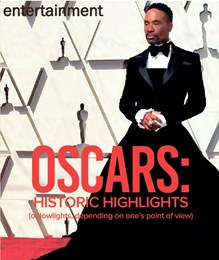REALITY, USA – Comedian Chris Paul likened it to Hollywood reparations for black people.
Other observers are commenting on how the Oscars ain’t – oops, sorry – aren’t so white anymore.
That’s after a history making seven AfricanAmerican men and women garnered Academy Awards on Sunday.
True critics knew, of course, that Mahershala Ali’s portrayal of Dr. Don Shirley in “Green Book”
had to land him an Oscar win, because Hollywood loves telling black people’s stories through the minds of white people. More on that in a bit.
Meanwhile, for his role in “Moonlight,” Ali also became the first black actor to win two Best Supporting Actor Oscars.
Also, we telegraphed on these pages last week that Ruth Carter was a superb candidate to become the first African-American to land an Oscar in Costume Design, for her Afro-futuristic “Black Panther” wardrobe.
Yet … with the Academy of Motion Picture Arts and Sciences’ record having been so bad, for so long, that #OscarsSoWhite has trended on social media for years, who foresaw the new hashtag:
#OscarsSoBlack?
Then again, who saw Hannah Beachler becoming the first African-American Academy Award winner for Production Design, also for the renowned “Black Panther.”
Could this have been the work, as comedian Paul suggests, of the Academy Awards Reparations Committee?
Because yikes! – they did it again: Co-director Peter Ramsey too made Academy Awards history as the first black winner for Best Animated Feature, “Spider-Man: Into the SpiderVerse.”
And again: Super-talented Regina King, Best Supporting Actress Oscar winner for “If Beale Street Could Talk.”
And again and again, seven times total: Previously nominated five times, Spike Lee finally got his reparations – er, Oscar – along with Kevin Willmott for Best Adapted Screenplay in”BlacKkKlansman”
Of course, we knew that whatever the Academy of Arts and Sciences did, Spike wasn’t going to be happy. Which brings us back to the controversy over “Green Book.” Spike’s and others’ frustration was visibly – and justifiably – apparent when it was crowned Best Picture.
The movie morphed the true story of mail carrier Victor Hugo Green’s “Negro Motorist Green Book” (later “The Negro Travelers’ Green Book”), published in the 1930s through 1960s as an essential guide for African Americans’ safe travel through the country and beyond, into the racially stereotypical, sentimentalized story of Italian-American chauffeur (Tony Vallelonga, screenwriter Nick’s father) befriends gay black classical musician Shirley, who he chauffeurs on a deep south concert tour.
“A racial reconciliation fantasy written for white people, by white people,” wrote blogger Anne Branigin, who obviously has been paying attention.
“That Shirley, the black piano-playing virtuoso around whom the plot revolves, is considered the supporting character in this film tells you almost everything you need to know,” Branigin said. “That Shirley’s family have vehemently objected to the film tells you the rest.” She cited a Huffington Post report that those surviving relatives called the film “a symphony of lies” when the film was released in November.
Screenwriter son Nick, added Branigin, “wanted to make a movie about his daddy; but, his father was an unremarkable man. So, he stole the legacy of a talented musician and the history of Black Americans to elevate his father’s average life (and make some money). This is the history of the USA even today. Steal and benefit from the labor and experiences of Black people to prop up and establish white people. Of course racist Hollywood would celebrate this shameful conduct with an Oscar. It’s the American way!”
Thus, “No disrespect to Green Book at the #Oscars,” tweeted political commentator Keith Boykin, “but many of us in the black community would like to see greater recognition for movies about the black experience and not just for movies that make the black experience comfortable for white audiences.”
Film director and producer Ava DuVernay went further: “For anyone who may be interested in what the Green Book actually was, here is a link to more information about this act of resistance and source of love and survival for many African-Americans. It started with Victor Hugo Green,” she tweeted, adding a link to his Wikipedia page.
But Civil Rights Movement icon John Lewis liked the movie – bearing witness, while introducing it, “that the portrait of that time and place in our history is very real.” And anyone who would disrespect Lewis deserves none.
The Oscars are hardly controversial, right? That makes entertainer Billy Porter’s tuxedo dress on the Oscars red carpet just more of the same.
The backstory apparently is that “South Park” creators Trey Parker and Matt Stone wore dresses to the 2000 Oscars as a joke, but Porter had fashion designer Christian Siriano create his tux/gown couture piece.
Porter is fresh off his gig as New York Fashion Week’s official men’s show ambassador,” reports hollywoodreporter.com, “where he donned more than 20 looks ranging from a pearl bib, drop earrings and pearl-embellished sunglasses at The Blonds to a metallic floral-embellished resort top and pants at Michael Kors.”
Speaking for himself, Porter told “Vogue,” “I’m invited to red carpets and I have something to say through clothes. My goal is to be a walking piece of political art every time I show up. To challenge expectations. What is masculinity? What does that mean? Women show up every day in pants, but the minute a man wears a dress, the seas part.”
He added that “From this (Oscars) moment, I want people to understand that you don’t have to understand or even agree with other people’s authenticity or truths, but we must all respect each other. People are going to be really uncomfortable with my black a– in a ball gown – but it’s not anybody’s business but mine.”
Sound like freedom as reparations? Anyway, credit Hollywood for a course correction, at least for one year.
All this all brought to mind some outrageously serious satire of bygone days. Some will remember (others can look it up, even watch online) that “Putney Swope” was either profoundly masterful or a hard look, depending on one’s point of view.
But Putney at least told our story, through our eyes. Memo to Hollywood: “Got to have soul!”













No Comment